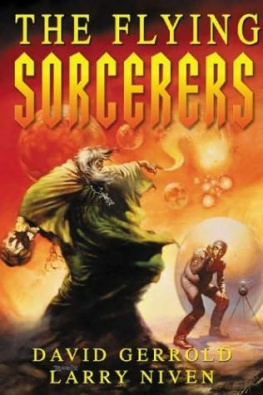David Gerrold - A Rage for Revenge
Here you can read online David Gerrold - A Rage for Revenge full text of the book (entire story) in english for free. Download pdf and epub, get meaning, cover and reviews about this ebook. year: 1989, genre: Science fiction. Description of the work, (preface) as well as reviews are available. Best literature library LitArk.com created for fans of good reading and offers a wide selection of genres:
Romance novel
Science fiction
Adventure
Detective
Science
History
Home and family
Prose
Art
Politics
Computer
Non-fiction
Religion
Business
Children
Humor
Choose a favorite category and find really read worthwhile books. Enjoy immersion in the world of imagination, feel the emotions of the characters or learn something new for yourself, make an fascinating discovery.
- Book:A Rage for Revenge
- Author:
- Genre:
- Year:1989
- Rating:3 / 5
- Favourites:Add to favourites
- Your mark:
- 60
- 1
- 2
- 3
- 4
- 5
A Rage for Revenge: summary, description and annotation
We offer to read an annotation, description, summary or preface (depends on what the author of the book "A Rage for Revenge" wrote himself). If you haven't found the necessary information about the book — write in the comments, we will try to find it.
A Rage for Revenge — read online for free the complete book (whole text) full work
Below is the text of the book, divided by pages. System saving the place of the last page read, allows you to conveniently read the book "A Rage for Revenge" online for free, without having to search again every time where you left off. Put a bookmark, and you can go to the page where you finished reading at any time.
Font size:
Interval:
Bookmark:

The War Against the Chtorr: Book Three
A Rage for Revenge
David Gerrold
for Frank Robinson, with love
Author's Introduction
I am going to break Rule Two.
Rule One is: Never bore the audience.
Rule Two: Never explain your work. Especially don't explain it, before.
I am now going to break Rule Two. Flagrantly.
This particular episode of The War Against The Chtorr includes a number of chapters of heavily didactic material. I am concerned that some of this material may need to be annotated. I would hope that I am wrong, but for reasons that should become abundantly clear long before you get to the end of the book, I choose to err on the side of caution.
This book is didactic. It needs to be didactic.
There is nothing inherently right or wrong in a book being didactic-although some critics and reviewers have taken the position that didacticism in a work of fiction is only slightly more offensive than spitting on the Madonna. The truth is that didacticism is only a description, not a judgment; it is not a quality that can be assigned rightness or wrongness. The use of the didactic technique, however, can be judged either clumsy or exquisite, and that is a judgment that is always appropriate for people who need to have opinions about other people's opinions. My dictionary defines "didactic" this way:
1. intended for instruction.
2. preaching or moralizing.
Both definitions of the word are appropriate to this work. This is your warning. This book preaches and moralizes. It is also intended for instruction.
And therein lies the danger.
(Bear with me. This is going to take some explaining.)
In books one and two of this series, A Matter For Men and A Day For Damnation, the hero of the narrative, Jim McCarthy, has encountered several graduates of a course called The Mode Training. In the context of the stories, it is apparent that The Mode Training is a well-known and somewhat respected course, though not without its skeptical observers and detractors.
In book three of this series, the book you are holding now, McCarthy participates in the six-week course called The Mode Training.
I want this to be absolutely clear:
There is no such thing as The Mode Training. It is a fictitious course.
It does not exist.
It is not based on any specific course of instruction that I know of that is available anywhere on Earth.
The Mode Training, the name as well as the idea behind it, is copyright to me, David Gerrold, 1988. It is not for sale. It is not for rent. It is not for lease. The course is not available under any circumstances. I have no intention of authorizing such a course. It is a fiction and I intend that it remain so. This is the most responsible position that I can take in regard to a totally fictitious seminar series.
I say that because I do not want anyone-especially unqualified charlatans-setting up any kind of course based on this work. I have extrapolated this "technology of consciousness" as a place for the reader to visit only so that he or she may consider its nature. By no means should anyone consider The Mode Training as a real or even as a possible event.
(I particularly do not want to attend a science fiction convention and discover to my horror that someone has appointed himself a "Foreman" and is charging $5 a head to abuse an unsuspecting audience. Worse, I do not want anyone to think that such an experience validates them as an enlightened human being. If enlightenment were that easy-well, never mind; that's a whole other story.)
Let me also take this opportunity to discuss the source material for The Mode Training.
First, let me tell you what it is not bawd an,
The Mode Training is not based on Lifespring, Summit, Insight, Esalen, The Experience, or any other workshop, course, or seminar series. It is not derived from Dianetics, Scientology, The Rosicrucians, Silva Mind Control, Science of Mind, or any other religious study.
However, the extrapolation of such a course as The Mode Training is based on the fact that such courses as the ones listed above do exist. In fact, only a few years ago, the United States Army was investigating the possibility of adapting or including the est training as part of its basic training procedures for new recruits. That triggered this thought: What would a military version of est be like? No, forget est for a minute-that carries connotations that I don't want attached to this idea. But do consider this: What would a nation be like if its process of education was not one of indoctrination, but training? What if human beings could actually be trained to succeed-not only in their personal lives, but in their larger responsibilities to family, nation, and species? What would it be like to live among such people?
I was fascinated with the thought, intrigued by the idea of a nation training itself to be responsible. It was a remarkable question to consider. What will the next step in the evolution of human consciousness look like?
It was early in the writing of this book that I realized that it was not sufficient to extrapolate simply the alien ecology of the Chtorr; I also had to extrapolate a believable future for the Earth. It is unacceptable for a novel of the future to demonstrate only the technological advances that could occur in the next fifty years; a truly visionary novel must also explore the spiritual and psychological shifts that are possible, and how they might have come about.
I have to acknowledge that the question demanded considerable research into a number of courses, seminars, workshops, and even a couple of cults. I was looking for the underlying principles behind their ability to produce results. I became fascinated by the philosophical as well as the psychological underpinnings of many of these courses, and the astute reader may notice the occasional sideways reference here and there; however, no specific influence should be considered the sole source material or foundation for The Mode Training.
If anything, The Mode Training is nothing more than the study of Zen, as taught by a rather savage Socratic dialogue.
I make no claims that The Mode Training is anything more than the extrapolation of a possibility. That's all that it has ever been intended to be.
It is not an opinion.
It is not a prediction.
It is not a warning.
It is only an extrapolation. I like to play with ideas. I was interested in the idea of a "Mode Training" and I took it as far as I could for the sheer fun of seeing how far I could take it. Anyone who tries to read anything deeper into the Mode chapters will only be making an ass of himself.
Which brings me to my last point:
Please do not assume that because something is written in this book or in this series, that I endorse it or that it represents my personal philosophy. It may; equally, it may not. I have deliberately written much into these books that I disagree with, if for no other reason than to confound critics and academics, but primarily because you cannot have an interesting argument unless both sides get a fair hearing. In either case, armchair analysts will be on much safer ground to assert that my characters have seized the responsibility of speaking for themselves and their own concerns.
If you find the didactic parts of this book to be disturbing, troublesome, or annoying, then please consider them to be successful. They will have accomplished their job; because that is exactly what they were intended to do.
--David Gerrold , Hollywood, 1988
THANK YOU:
Dennis Ahrens, Seth Breidbart, Jack Cohen, Richard Curtis, Diane Duane, Richard Fontana, Bill Glass, Harvey and Johanna Glass, David Hartwell, Robert and Ginny Heinlein, Don Hetsko, Karen Malcor, Susie Miller, Jerry Pournelle, Michael St. Laurent, Rich Sternbach, Tom Swale, Linda Wright, Chelsea Quinn Yarbro, Howard Zimmerman.
Next pageFont size:
Interval:
Bookmark:
Similar books «A Rage for Revenge»
Look at similar books to A Rage for Revenge. We have selected literature similar in name and meaning in the hope of providing readers with more options to find new, interesting, not yet read works.
Discussion, reviews of the book A Rage for Revenge and just readers' own opinions. Leave your comments, write what you think about the work, its meaning or the main characters. Specify what exactly you liked and what you didn't like, and why you think so.












